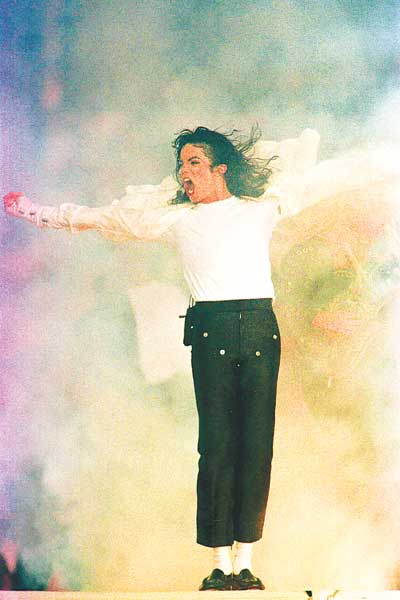Legends of the ilk of Michael Jackson die to leave behind both a legacy and an influence. For China, it is the latter, which is being discussed passionately today among thousands of his fans here after the music icon has passed away in a sudden cardiac arrest.

There are all kinds of reactions to Michael Jackson's death here: shock, disbelief, grief or the feeling of being lost. But Ding Dawei, one of his numerous Chinese fans born in late 1960s, said he should have died a long time ago.
"There will be more serious thought upon his music and influence when he is dead than alive," said Ding, 37, an IT professional in Beijing.
Ding first felt the influence of this super pop star in 1990, when he was still a student of the Dalian University of Technology in Northeast China's Liaoning Province.
"It was from the window of a big shopping center that I first ran into his music and dance. It shook me. I stood there watching for more than two hours, while Bad was repeatedly played on the screen," Ding recalled.
To Ding and many others, Jackson represented an idea that was so uplifting for a generation just waking up to reforms. "His style was a perfect blend of music and body movement, but we will remember him most for the vigor and passion that we had never tasted before," he said.
Though the reform and opening-up policy had been implemented in the country for a decade at that time, most Chinese still had little knowledge about the Western society. Stern debates on whether certain reforms were socialist or capitalist still prevailed in the country.
In late 1980s, rock'n'roll showed up in China, and here came Michael Jackson, quickly turning into one of the most influential icons of the Western culture to Chinese people.
"If you were young and sensitive to rhythm, you would surely fall in love with his music," said 41-year-old Wang Xiaofeng, a well-known music critic, while describing the heat Jackson created at his heyday.
In the summer of 1986, Wang got a copy of Jackson's songs from his schoolmate who had managed to buy the album from an exhibition of audio and video products.
"In the first few minutes, his music got me," said Wang, "I had no idea about rock'n'roll until that moment."
"You just love him, and there is no way to get rid of it," Wang said. During his college life from 1986 to 1990, Wang took advantage of being a DJ at the school radio by playing Jackson's songs.
But it had not been easy for Wang to carry on his fervor, as the whole country lacked the atmosphere. "Radios did not play his songs and the media had no clue about rock 'n' roll."
With no official publicity at all, Jackson's music was disseminated among the public through individual efforts. People with relatives in Hong Kong or Taiwan would help bring in copies of Jackson's albums when there was no Internet.
"You could feel how free Jackson was when performing on the stage, and then you could hardly stop thinking about the freedom he enjoyed off the stage," Wang said, "It's common for people to dig and yearn for things that help create art."
"Michael Jackson was a window through which the young Chinese looked out into the world a dozen years ago," said Zhang Yiwu, a professor of Peking University.
And it also seemed rebellious to idolize Jackson, as everything about him – dazzling dresses, long hair and even his dance, were all challenges to the orthodox principles the society had obeyed for a long time.
Yi Zhenyu, 35, a real estate manager assistant in Chengdu, Sichuan Province, still remembers how his mania for Jackson upset his mother. "She was deeply worried, fearing that Jackson would turn me into a back street boy," he said.
In early 1990s, there were still critics calling his dance obscene and nasty, but nothing could stop eager Chinese fans from mimicking his "moon walk". In awe of his songs, his fans took to learning his moves from the many dance schools that mushroomed all over claiming to know the art of Jackson's jigs.
However, Ding continues to listen to Jackson's songs. "No matter when you listen to his songs, you can always feel the power."
(Global Times June 29, 2009)